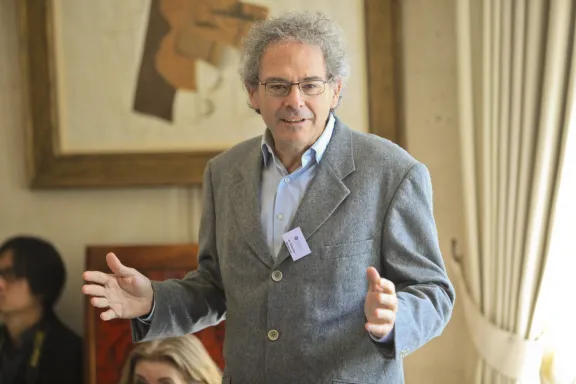Sebastian Amigorena Training our immune system to defend itself against cancer by unravelling the function of dendritic cells
Sebastian Amigorena, CNRS Research Director at Institut Curie Institut Curie's website
- 2005 • Liliane Bettencourt Prize for Life Sciences



Sebastian Amigorena has highlighted the central role played by dendritic cells in our immune system. His work is focused on unmasking the secret weapons of these sentinel cells, and he theorises that they could be programmed to trigger an immune response to fight cancer.
Immunological warfare: dendritic cells on the front line
Concealed in the mucosa and all lymphoid organs, dendritic cells play the dual role of sentinel and master controller of the immune system.
They detect pathogens, capture them and expose the antigens on the surface of these infectious agents. They then migrate to present these antigens to lymphocytes, thus triggering an immune response.
Can dendritic cells activate the same type of immune response in the presence of tumour cells? Sebastian Amigorena’s research aims to provide answers to this crucial question.
Anti-tumour immune response and why our immune system does not fully protect us from cancer
In contrast to bacteria or viruses, cancer cells are not foreign pathogens invading the body, but are part of the "self". However, the immune system can recognise these tumour cells as being the "altered self", and a danger to the body.
Dendritic cells identify tumour antigens and present them to lymphocytes. However, in many cases, the immune response triggered is not sufficient to completely eliminate cancer.
By elucidating the various elements involved in the activation of immune response by dendritic cells, Sebastian Amigorena has theorised that the immune system could defend itself against cancer.
Working towards a cancer vaccine
The Fondation was keen to support this research, which is leading the way in the development of immunotherapy for cancer.
With their pioneering use of multiphoton microscopy techniques, Sebastian Amigorena and his team successfully observed the interactions between dendritic cells and T lymphocytes in lymph nodes.
They demonstrated that, in contrast to other phagocytes, dendritic cells only partially degrade ingested pathogens, preserving fragments of proteins which they then present to lymphocytes.
This discovery has been crucial to the development of anti-tumour vaccines, which involves harvesting dendritic cells to integrate proteins specific to the targeted tumour. Inoculating these modified cells reduces the immune system’s tolerance to the tumour and boosts immune response.
Sebastian Amigorena in a few words
After training as a biologist, Sebastian Amigorena undertook his PhD at the Institut Curie (Paris), specialising in immunology. His research elucidated several mechanisms relating to antibody production by B lymphocytes.
Initially a post-doctoral research fellow at the Institut Curie, he completed a second post-doctoral research project on the cell biology of antigenic presentation in B lymphocytes at Yale University, USA.
After returning to France in 1995, he put together his own research team at the Institut Curie, focusing on the cell biology of antigen presentation.
His work has received numerous awards, including the Liliane Bettencourt Prize for Life Sciences in 2005, and the Fredrick W. Alt Award for New Discoveries in Immunology in 2012.
The work of Sebastian Amigorena and his team has thrown light on the mechanisms of antigen presentation and T lymphocyte priming by dendritic cells, paving the way for highlypromising clinical applications in immunotherapy for cancer.
-
1990 PhD in Biochemistry and Immunology, Paris Diderot University
-
1990 Post-Doctoral Fellowship in the laboratory of Dr. Wolf Hervé Fridman, Institut Curie, Paris
-
1990 CNRS Researcher
-
1993 Post-Doctoral Fellowship in the laboratory of Dr. Ira Mellman, Department of Cell Biology, Yale University, New Haven (USA)
-
1995 Head of the Biology of Antigen Presentation team, Inserm Unit/Institut Curie, Paris
-
1999 CNRS Research Director
-
2005 CNRS Silver medal and Liliane Bettencourt Prize for Life Science
Liliane Bettencourt Prize for Life Sciences
The Liliane Bettencourt Prize for Life Sciences rewards each year a researcher under the age of 45 for the excellence of their work and their remarkable contribution to their field of scientific research. This prize is awarded, depending on the year, to a researcher based in France or working in another European country. Thirty winners have been awarded since 1997. From 2023, prize rewards the laureate up to 100,000 euros.
All the award-winners